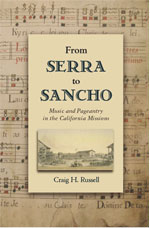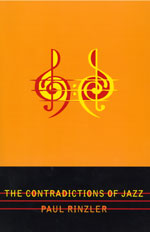Recent Releases: Faculty in Print
 Craig H. Russell
Craig H. Russell
In July of 2009, Oxford University Press released Prof. Craig H. Russell’s latest book, "From Serra to Sancho: Music and Pageantry in the California Missions." As Craig explains in the text, music in the California missions was a pluralistic combination of voices and instruments, of liturgy and spectacle, of styles and functions—and even of cultures—in a new blend that was non-existent before the Franciscan friars made their way to California beginning in 1769. This book explores the exquisite sacred music that flourished on the West Coast of America when it was under Spanish and Mexican rule; it delves into the historical, cultural, biographical, and stylistic aspects of California mission music during the late eighteenth and early nineteenth centuries. The book explores how mellifluous plainchant, reverent hymns, spunky folkloric ditties, “classical” music in the style of Haydn, and even Native American drumming were interwoven into a tapestry of resonant beauty. Aspects of music terminology, performance practice, notation, theory, sacred song, hymns, the sequence, the mass, and pageantry are addressed. Russell draws upon hundreds of primary documents in California, Mexico, Madrid, Barcelona, London, and Mallorca, and it is through the melding together of this information from geographically separated places that he brings the mystery of California’s mission music into sharper focus. In addition to extensive musical analysis, the book also examines such things as cultural context, style, scribal attribution, instructions to musicians, government questionnaires, invoices, the liturgy, architectural space where performances took place, spectacle, musical instruments, instrument construction, shipping records, travelers’ accounts, letters, diaries, passenger lists, baptismal and burial records, and other primary source material. Within this book one finds considerable biographical information about Junípero Serra, Juan Bautista Sancho, Narciso Durán, Florençio Ibáñez, Pedro Cabot, Martín de Cruzelaegui, Ignacio de Jerusalem, and Francisco Javier García Fajer. Furthermore, it contains five far-reaching appendices: a Catalogue of Mission Sources; Photos of Missions and Mission Manuscripts (with over 150 color facsimiles); Translations of Primary Texts; Music Editions (that are performance-ready); and an extensive Bibliography.
California’s mission culture is a topic that has fascinated Dr. Russell for many years and has led to a variety of publications and compact disc recordings in recent years, including Craig’s collaboration with the acclaimed choir Chanticleer twelve months ago. They made a compact disk and DVD on the Warner label, called Mission Road. Craig prepared all the music for this recording (and for their concert tour of the California missions), constructing the performing editions by using various snippets and fragments preserved in missions and archives up and down the California coast; he also plays baroque guitar on all of the tracks and served as the artistic consultant for the project. This new book with Oxford University Press is a further exploration of the topic that Dr. Russell had presented two years ago in the book J. B. Sancho: Compositor pioner Califòrnia (J. B. Sancho: Pioneer Composer of California) that was coauthored with Dr. Russell and Antoni Pizà (CUNY), William J. Summers (Dartmouth), and Antoni Gili i Ferrer (a priest from Artà, Mallorca). It was published by the Universitat de les Illes Balears in Palma de Mallorca, Spain, in 2007, and this book had the distinction of winning the Norman Neuerberg Award in 2009 that is granted each year by the Historical Society of Southern California for the most important publication concerning the history of the American Southwest.
Praise for FROM SERRA TO SANCHO (from the book cover)
Craig Russell presents us with both a remarkable scholarly study of music from the twenty-one missions and also a body of new performing editions of a number of works never before published. His twin goals of music performance utility and carefully crafted musicological scholarship are beautifully and equally realized through a totally approachable narrative loaded with vivid references to mission life, mission iconography and close readings of actual works penned in the missions. This new volume sets a ‘gold standard’ for research and scholarship on this fascinating epoch in American music history.
— Professor William John Summers, Dartmouth College
Craig H. Russell’s transatlantic odyssey traces how a few tenacious friars transformed Iberian music pedagogy into quotidian religious practices at the Alta California missions and enthusiastically offers a springboard for performers engaged in reviving this attractive New Spanish repertoire.
—Drew Edward Davies, Northwestern University
Craig Russell, expert and specialist in Latin American music and music of the California missions, is opening up a wealth of new repertoire from our own past that has been hitherto unavailable and is worthy of performance. This book and its many performing editions will be an invaluable addition to any choir director’s library.
—Joseph Jennings, Artistic Advisor, Chanticleer
 Paul Rinzler
Paul Rinzler
Scarecrow Press has published Rinzler’s latest book, “The Contradictions of Jazz.” The book explores four pairs of opposites expressed in jazz: individualism and interconnectedness, assertion and openness, freedom and responsibility, and creativity and tradition. For example, individualism is expressed in jazz through the ubiquitous improvised solo; interconnectedness occurs when every member of the jazz ensemble spontaneously changes what they play in relation to what everyone else is playing, sometimes radically changing the nature of the music.
These eight values define much of the significance of jazz. Furthermore, these opposites can coexist at the same time and in the same improvisation. This is in contrast to viewing each pair of opposites through what is sometimes called "either/or thinking," in which only one member of an opposite pair prevails (for example, in sports, one team must win and one team must lose). How these opposites are present simultaneously and yet clash with each other in dynamic tension is fundamental to the meaning of jazz.
Understanding how these opposites coexist in jazz leads to an exploration of the connections linking jazz with the experiential and existential, which contrasts with the connections between composition and science. The larger meaning of these contradictory opposites depends on ideas from the philosophies of phenomenology and existentialism. The book considers the opposites inherent in the product and process of jazz, as well as mistakes and the challenge of perfection, presenting these values in light of the contradictions inherent in jazz.

